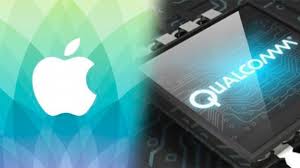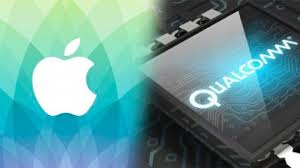
After the U.S., China is the next legal battleground for Apple Inc. and Qualcomm, who are now locked in multiple legal battles.
Beijing's Intellectual Property Court said in a statement that alleging the chip supplier abused its clout in the chip industry and seeking 1 billion yuan ($145.32 million) in damages, the U.S. based iPhone maker has filed a lawsuit against Qualcomm Inc in Beijing.
Accusing Qualcomm of failing to live up to promises made to license "standard essential patents" broadly and inexpensively, Apple also filed a second lawsuit against its former chip supplier.
For "modem" chips that connect phones to wireless networks, Qualcomm is a major supplier to both Apple and Samsung Electronics Co Ltd. In the most recent fiscal year, 40 percent of Qualcomm's $23.5 billion in revenue was accounted for by the two companies together.
Apple accused Qualcomm of refusing to pay some $1 billion in promised rebates and of overcharging for chips in the lawsuit filed in U.S. District Court for the Southern District of California. Because of Apple's discussions with South Korea's antitrust regulator, the Korea Fair Trade Commission, Qualcomm withheld the rebates, Apple said in its complaint.
It had not yet seen the full complaints against it filed in the Chinese court, Qualcomm said in an emailed statement. However, after a 2015 regulatory ruling in China and that his firm would defend its business model in Chinese courts, Qualcomm had offered Apple the same terms as other customers, Don Rosenberg, executive vice president and general counsel of Qualcomm, said.
"These filings by Apple’s Chinese subsidiary are just part of Apple’s efforts to find ways to pay less for Qualcomm's technology," Rosenberg said in the statement. "Apple was offered terms consistent with terms accepted by more than one hundred other Chinese companies and refused to even consider them."
Earlier on January 17, Qualcomm has also been accused of using anticompetitive tactics to maintain its monopoly of a key semiconductor used in mobile phones by the U.S. Federal Trade Commission in a complaint.
Days after the U.S. government accused the chip maker of resorting to anticompetitive tactics to maintain a monopoly over key semiconductors in mobile phones, Apple filed a $1 billion lawsuit against supplier Qualcomm.
There were no immediate comments available from Qualcomm. It would contest both the FTC and the Apple lawsuit filed in the United States, the company has said previously.
The chip maker faces legal challenges across the globe.
In South Korea too, the chip makers faces a fine of 1.03 trillion won ($854 million) which was slapped by South Korea's antitrust regulator against Qualcomm in December. The charges against it are what the regulator called unfair practices in patent licensing. Qualcomm has said that it would challenge the decision for fines in court.
While the European Union in December 2015 accused Qualcomm of abusing its market power to thwart rivals, the company paid a $975 million fine in China following a 14-month probe in February 2015.
(Source:www.reuters.com)
Beijing's Intellectual Property Court said in a statement that alleging the chip supplier abused its clout in the chip industry and seeking 1 billion yuan ($145.32 million) in damages, the U.S. based iPhone maker has filed a lawsuit against Qualcomm Inc in Beijing.
Accusing Qualcomm of failing to live up to promises made to license "standard essential patents" broadly and inexpensively, Apple also filed a second lawsuit against its former chip supplier.
For "modem" chips that connect phones to wireless networks, Qualcomm is a major supplier to both Apple and Samsung Electronics Co Ltd. In the most recent fiscal year, 40 percent of Qualcomm's $23.5 billion in revenue was accounted for by the two companies together.
Apple accused Qualcomm of refusing to pay some $1 billion in promised rebates and of overcharging for chips in the lawsuit filed in U.S. District Court for the Southern District of California. Because of Apple's discussions with South Korea's antitrust regulator, the Korea Fair Trade Commission, Qualcomm withheld the rebates, Apple said in its complaint.
It had not yet seen the full complaints against it filed in the Chinese court, Qualcomm said in an emailed statement. However, after a 2015 regulatory ruling in China and that his firm would defend its business model in Chinese courts, Qualcomm had offered Apple the same terms as other customers, Don Rosenberg, executive vice president and general counsel of Qualcomm, said.
"These filings by Apple’s Chinese subsidiary are just part of Apple’s efforts to find ways to pay less for Qualcomm's technology," Rosenberg said in the statement. "Apple was offered terms consistent with terms accepted by more than one hundred other Chinese companies and refused to even consider them."
Earlier on January 17, Qualcomm has also been accused of using anticompetitive tactics to maintain its monopoly of a key semiconductor used in mobile phones by the U.S. Federal Trade Commission in a complaint.
Days after the U.S. government accused the chip maker of resorting to anticompetitive tactics to maintain a monopoly over key semiconductors in mobile phones, Apple filed a $1 billion lawsuit against supplier Qualcomm.
There were no immediate comments available from Qualcomm. It would contest both the FTC and the Apple lawsuit filed in the United States, the company has said previously.
The chip maker faces legal challenges across the globe.
In South Korea too, the chip makers faces a fine of 1.03 trillion won ($854 million) which was slapped by South Korea's antitrust regulator against Qualcomm in December. The charges against it are what the regulator called unfair practices in patent licensing. Qualcomm has said that it would challenge the decision for fines in court.
While the European Union in December 2015 accused Qualcomm of abusing its market power to thwart rivals, the company paid a $975 million fine in China following a 14-month probe in February 2015.
(Source:www.reuters.com)





